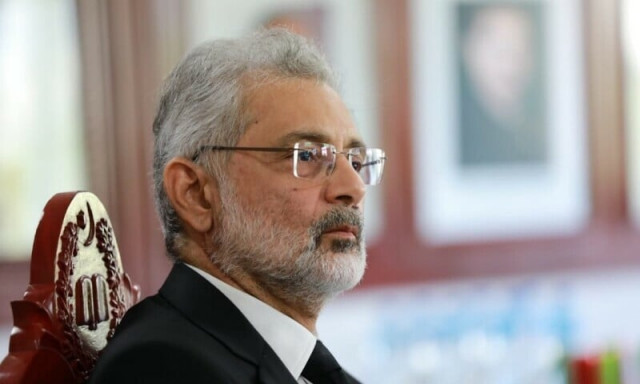Supreme Court slams its own Article 63-A judgment
CJP Qazi Faez Isa says in a 23-page, detailed judgement that previous ruling could turn party chiefs to dictators

The Supreme Court, criticising its earlier ruling on the interpretation of Article 63-A of the Constitution, had noted that the previous majority judgment paved the way to transform the leader of a political party into a dictator, simply because he or she could never be challenged.
"Another consequence of the majority’s judgment would be that once a Prime Minister and Chief Ministers are elected, they can never then be removed either by their own party or by the majority membership of the concerned assembly. Nothing can be more undemocratic; the majority’s judgment has opened the way to transform the leader of a political party into a dictator, simply because the party’s leader can never be challenged," read the 23-page detailed judgement authored by Chief Justice of Pakistan Qazi Faez Isa.
The court noted that the “majority judgment held that a member who votes contrary to the direction of the Parliamentary Party, the vote of such member is not to be counted/negated, not only the express provisions of Article 63A but also the following provisions of the Constitution: (a) Article 91(7), whereunder a Prime Minister may be called upon to obtain a vote of confidence from the National Assembly, (b) Article 95, under which a resolution is submitted seeking a vote of no-confidence, (c) Article 130(7), whereunder a Chief Minister is called upon to obtain a vote of confidence from the Provincial Assembly and (d) Article 136, which requires voting on a resolution of no-confidence against a Chief Minister.”
These constitutional provisions were rendered redundant.
"Substituting constitutional provisions with personal likes and moralisms must be avoided. What a particular judge considers to be right or wrong, or ethical or unethical, is neither the law nor the Constitution.
While lawmakers may transform moral precepts into law, however, the courts are concerned with what is lawful or unlawful. Parliament makes the law which the courts apply, and if there is any ambiguity in the law a judge interprets it, but this too must be done within the parameters of the law and as per the well-settled rules of interpretation."
The court has noted that instead of a constitutional or legal basis, the majority judgment has a surfeit of moralisms and non-legal terminology, such as healthy (41 times), unhealthy (5 times), vice (9 times), evil (8 times), cancer (8 times), menace (4 times), etc.
"The majority’s judgment also reflects a complete distaste for parliamentarians (in paragraph 106) as it proclaims that in the history of Pakistan and its Parliament only once did a parliamentarian come close to becoming a ‘conscientious objector who took the path of defection and deseating under Article 63A.’ The expression of such contempt for politicians and parliamentarians is regrettable. Let us not forget that Pakistan was achieved by politicians who had gathered under the banner of the All-India Muslim League and its Quaid (leader), MA Jinnah, who strictly followed the constitutional path."
The court noted that the majority’s short order and the majority’s judgment are set aside as they are against the clear language and mandate of the Constitution and are also contrary to the decisions of the larger benches of the court.
"The conclusions arrived at by the Judges who were in the minority are sustained" The court noted that judges in the majority, with great respect, had also not noted the particular language which was used in the Constitution.
"In clause (4) of Article 63-A, the word cease is used and it is stated that a member ‘shall cease to be a member’ whereas the word disqualify is used in Article 63 ‘disqualifications for membership.’ Ceasing to be a member (on account of defection) is not mentioned in Article 63, let alone that the defector is disqualified or suffers disqualification.
"To state the obvious, cease means to stop, to come to an end or to forfeit whereas disqualification or disqualify means to render ineligible, to be unfit or to disentitle. The words and the language used in the Constitution, its placement and context were overlooked by the three Hon’ble Judges."
The majority’s judgment interestingly referred to decisions from a number of countries and forums, including from the United States of America, Canada, United Kingdom, India and the Privy Council. Foreign legal books and authors were also quoted. But, this appears to have been done, without first ascertaining the law in the respective countries regarding defections, and the consequences thereof.
The Reference, which was filed by President Dr Arif Alvi on March 21, 2024, did not disclose that a resolution seeking a vote of no-confidence had been submitted in the National Assembly on March 8, 2022, against the then Prime Minister Imran Khan.
The court noted that Article 186 of the Constitution enables the President to seek an ‘opinion of the Supreme Court on any question of law which he considers of public importance’, however, instead of seeking an opinion on questions of law, President Alvi expounded what he considered to be a moral issue, gave his own opinion and wanted this Court to concur with it.
The text which accompanied the Questions of Law was similarly worded and expressed that those who voted against their party should be disqualified for life and in this regard relied upon the judgment of this Court in the case of Sami Ullah Baloch v Abdul Karim Nousherwani (PLD 2018 Supreme Court 405).
However, the Sami Ullah Baloch decision was overruled by a larger seven-member Bench of this Court in the case of Hamza Rasheed Khan v Election Appellate Tribunal (2024 SCP 65, on the Supreme Court’s website) wherein it was held that lifelong disqualification is not prescribed by the Constitution, and if this was done it would be ‘reading into the Constitution’, which was not permissible."
“Article 63A does not state that the votes of any member should not be counted nor that a member who does not vote or abstains from voting contrary to the Parliamentary Party’s direction would automatically be de-seated, but this is what the Hon’ble Judges (in the majority) did.
Usman Buzdar had resigned as the Chief Minister of Punjab and a new Chief Minister had to be elected. On April 16, 2022, Hamza Shahbaz was elected as the Chief Minister having secured 197 votes, though only 186 votes were required. A number of votes were cast in his favour by Members of the Provincial Assembly (‘MPAs’) belonging to PTI.
The majority’s short order of May 17, 2022, which was in respect of the National Assembly, came to determine who would be the chief minister of Punjab. The short order was passed in matters which had become infructuous but it still decided that if votes were cast against the Parliamentary Party’s direction these would not be considered and this ‘would [also] constitute a declaration of defection’.
The short order effectively invalidated Hamza Shahbaz’s election as chief minister. The votes cast in his favour by PTI members were discarded and they were also de-seated, but they were not issued notices by this Court; in the said three matters their fundamental rights of fair trial and due process, guaranteed by Article 10A of the Constitution, stood nullified.
The majority’s judgment, which held that a member who votes contrary to the direction of the Parliamentary Party, the vote of such member is not to be counted negated not only the express provisions of Article 63A but also the following provisions of the Constitution: (a) Article 91(7), whereunder a Prime Minister may be called upon to obtain a vote of confidence from the National Assembly, (b) Article 95, under which a resolution is submitted seeking a vote of no-confidence, (c) Article 130(7), whereunder a Chief Minister is called upon to obtain a vote of confidence from the Provincial Assembly and (d) Article 136, which requires voting on a resolution of no-confidence against a Chief Minister.
These constitutional provisions were rendered redundant. Another consequence of the majority’s judgment would be that once a prime minister and chief ministers are elected, they can never then be removed either by their own party or by the majority membership of the concerned assembly.
Nothing can be more undemocratic; the majority’s judgment has opened the way to transform the leader of a political party into a dictator, simply because the party’s leader can never be challenged. The court said that substituting constitutional provisions with personal likes and moralisms must be avoided.
"What a particular Judge considers to be right or wrong, or ethical or unethical, is neither the law nor the Constitution. While lawmakers may transform moral precepts into law, however, the courts are concerned with what is lawful or unlawful. Parliament makes the law which the courts apply, and if there is any ambiguity in the law a judge interprets it, but this too must be done within the parameters of the law and as per the well-settled rules of interpretation.
"Instead of a constitutional or legal basis, the majority’s judgment has a surfeit of moralisms and non-legal terminology, such as healthy (41 times), unhealthy (5 times), vice (9 times), evil (8 times), cancer (8 times), menace (4 times), etc.
"The majority’s judgment also reflects a complete distaste for parliamentarians (in paragraph 106) as it proclaims that in the history of Pakistan and its Parliament only once did a parliamentarian come close to becoming a ‘conscientious objector who took the path of defection and deseating under Article 63A.’
The expression of such contempt for politicians and parliamentarians is regrettable. Let us not forget that Pakistan was achieved by politicians who had gathered under the banner of the All India Muslim League and its Quaid (leader), MA Jinnah, who strictly followed the constitutional path. Therefore, for all the aforesaid reasons, the majority’s short order and the majority’s judgment are set aside as they are against the clear language and mandate of the Constitution and are also contrary to the decisions of the larger benches of this Court. The conclusions arrived at by the judges who were in the minority are sustained. These are the reasons for our short order dated October 3, 2024," stated the judgement.




















COMMENTS (3)
Comments are moderated and generally will be posted if they are on-topic and not abusive.
For more information, please see our Comments FAQ